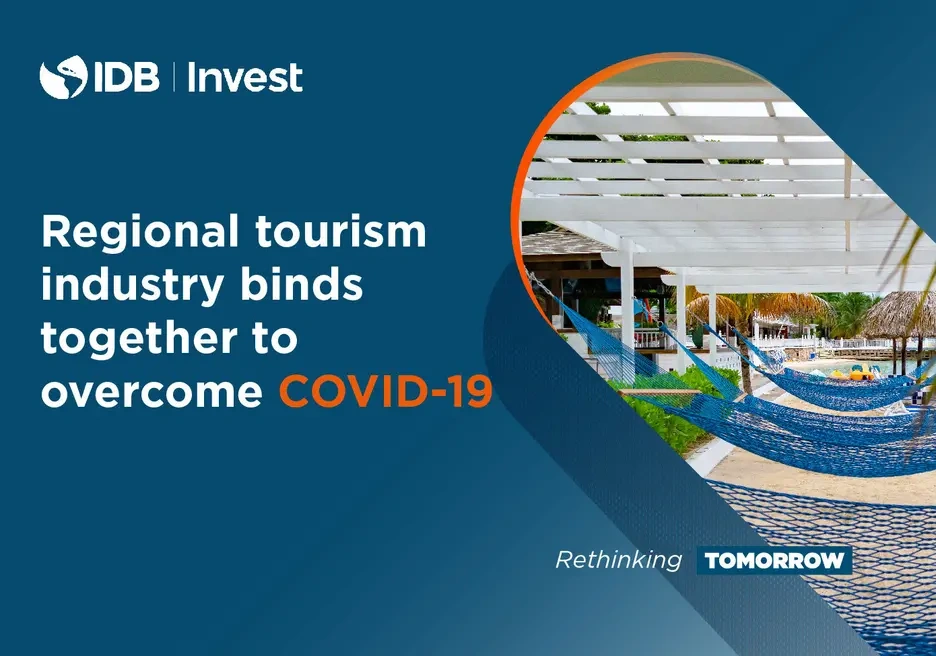Regional Tourism Industry Binds Together to Overcome COVID-19

The tourism industry plays an important role in Latin America and the Caribbean (LAC). It contributes to approximately 9.4% of GDP and 8.5% of total employment. This is particularly true for the Caribbean, the region with the industry’s highest contribution to GDP and employment in the world. However, the COVID-19 health crisis has abruptly changed this. Several governments in the region were quick to act and closed borders to international air traffic and enacted strict stay-at-home mandates to curb the spread of the pandemic.
These initiatives were important to soften the precipitous growth in contagion but brought the performance of the tourism sector to a screeching halt. The tourism sector in LAC was particularly affected and hoteliers observed in disbelief how their peak performance in late February experienced dramatic and unprecedented deterioration in as little as a couple of weeks.
According to Smith Travel Research (STR), occupancy in LAC declined from approximately 93% in the first week of March to approximately 45% three weeks later, with many individual properties experiencing significantly lower occupancy.
The impact on operations has been significant, as the majority of hotels in the region are closed or with extremely downsized operations. Those that remain open have shifted their focus towards accommodating first responders, returning stranded citizens, serving as supplemental hospital accommodations, or acting as alternate office locations for companies practicing social distancing. For closed hotels, nearly all line staff have been furloughed or laid off, whereas a high percentage of management teams have been retained, though with significant temporary reductions (30%-50%) in salary.
The current struggle
As tourism awaits the reopening of economies, IDB Invest stayed close to industry stakeholders, including local hotels/attractions, banks, market consultants and non-governmental associations, to understand how they are handling the pandemic and mitigating the impact on the business, employees and the community at large. From all the responses one thing was clear: this is one instance when no one has the luxury to stand on the sidelines and be a spectator.
Most industry stakeholders are playing their part to cushion the impact on those most impacted, and to get the industry restarted. In our discussions with hoteliers, they are focused on a few key areas; (i) Preserving cash; (ii) Seeking concessions on existing credit facilities; (iii) Providing support to their employees and local community; (iv) Preparing for the post COVID-19 environment.
Aside from the obvious priority of protection of life, cash preservation has been of utmost importance for the survival of the sector. Supervision teams are focused on cash flow management and doing whatever it takes to remain solvent in an environment of reduced and in many cases zero revenues. Hoteliers have made considerable efforts to reduce their cash burn rate, which ranges from an average of US$500/room per month to US$1,200/room per month, excluding insurance and debt service. Although most have laid off or furloughed the majority of staff, some are providing support to their employees via food donations, either from their existing pantry or by purchasing basic food items from local suppliers.
Given the fall-out in the industry, having sufficient cash reserves, access to lines of credit and leveraging relationships from cooperative lenders with creative solutions and flexible loan terms, are significant competitive advantages. In terms of existing loans, most owners are obtaining some type of relief from lenders, whether voluntary or government mandated. In general, banks have been able to extend three- to six-month moratoriums on principal and/or interest payments, though most have been reluctant to reduce or make concessions on interest rates. Some are providing reductions in commitment fees, for committed but undrawn facilities, for up to six months.
New solutions for the new normal
Though there are no standardized solutions, hoteliers are being creative and tailoring their crisis support to the intrinsic challenges of their respective communities. Some operators, for example, are using their food and beverage and housekeeping staff to provide food and cleaning supplies to area hospitals and medical facilities. Others are utilizing their idle maintenance crews to perform minor repair jobs, while some are supplying personal protective equipment (i.e., masks, gloves, etc.) to police, fire fighters, medical personnel and other first responders.
In terms of preparing for a new “normal,” hoteliers are taking this opportunity to adapt their online marketing strategies to adjust their message to a new reality, most likely incorporating biosecurity protocols and revamped cleaning standards. Retraining staff to observe new social distancing protocols with guests will become increasingly important. Some owners are also evaluating the need to adapt the physical footprint of their hotels, specifically the need to consider social distancing in common areas such as pools, bars and restaurants, as well as redesigned protocols around buffet food stations.
The procedures relative to large gatherings, especially convention and social events will also need to be revisited to provide confidence for both guests and employees. In fact, this pandemic will require the implementation of enhanced health and safety measures and cleaning procedures, including the presence of convenient and friendly sanitization stations for guests and staff throughout the property.
Although the COVID-19 crisis is devastating the entire tourism sector, the industry is resilient and has overcome other major setbacks in the past. The sector’s response has been fast, creative and dynamic. Owners, operators, governments, lenders and the community are all genuinely working together to find solutions to the crisis. Given the depth and breadth of this pandemic, it will require a concerted effort, from all stakeholders, so that we can emerge stronger than before.■
LIKE WHAT YOU JUST READ?
Subscribe to our mailing list to stay informed on the latest IDB Invest news, blog posts, upcoming events, and to learn more about specific areas of interest.
Subscribe



